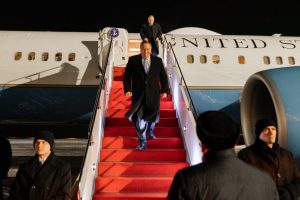U.S. Secretary of State Mike Pompeo said his recent tiff with NPR — in which he called a well-respected journalist a liar after a contentious interview and had another NPR reporter removed from his recent trip abroad — sends a “perfect message” on press freedom.
In an interview with Aigerim Toleukhanova, a reporter with RFE/RL’s Kazakh Service, known locally as Radio Azattyq, Pompeo denied having a confrontational interview with NPR reporter Mary Louise Kelly.
“Yeah, I didn’t have a confrontational interview with an NPR reporter any more than I have confrontational interviews all the time,” Pomepo said.
Pompeo’s recent trip took him to several countries with questionable records on press freedom. The brouhaha back in Washington between Pompeo and NPR brought heightened attention to the issue on his trip and his comments slipped from standard U.S. press freedom talking points into a defense of State’s barring of an NPR reporter from the trip in a fashion more common to Central Asian politicians.
From the interview, emphasis added:
In America that’s the greatness of our nation: Reporters like yourself get to ask me any question and all questions. We take hundreds and hundreds of questions. We talk openly. We express our view; they ask their questions. That’s how we proceed in America. And with respect to who travels with me, I always bring a big press contingent, but we ask for certain sets of behaviors, and that’s simply telling the truth and being honest. And when they’ll do that, they get to participate, and if they don’t, it’s just not appropriate – frankly, it’s not fair to the rest of the journalists who are participating alongside of them.
Accusing the media of lying is a go-to for Central Asian governments. The region’s governments and legal structures are far from press friendly. With the exception of Kyrgyzstan (which was rated as having a “problematic” press freedom situation), in its latest World Press Freedom Index, Reporters Without Borders slotted Kazakhstan, Uzbekistan, and Tajikistan into the “bad” category and Turkmenistan into “very bad.” Of 180 countries ranked, Kyrgyzstan landed at 83rd, Kazakhstan at 158th, Uzbekistan at 160th, Tajikistan at 161st, and Turkmenistan at 180th.
A number of independent media outlets in Central Asia have been pressured, sometimes out of existence as has been the case in Kazakhstan in recent years, by libel and other lawsuits. Governments unhappy with the media’s coverage often label unfavorable reports “fake” and “lies” and pass laws that make journalism more difficult and dangerous.
For example, in 2017 then-Kyrgyz President Almazbek Atambayev called out journalists and the media for spreading lies, slander, and “fake news” — borrowing U.S. President Donald Trump’s phrasing. Meanwhile, at the time, a bevvy of lawsuits were launched against local media outlets. At present, there are other ongoing lawsuits against Kyrgyz media outlets — including the Kyrgyz Service of RFE/RL — for bombastic investigative reports exposing corruption.
In late 2017, Kazakhstan enacted a series of amendments to the country’s media law that critics argued would further limit the press’ ability to operate. The changes included requiring that journalists receive permission from persons mentioned in their articles before publishing “personal, family, medical, banking, commercial [information] and other legally protected secrets” — arguably hampering investigative journalism.
Lawsuits are just one problem. Pomepo didn’t really respond to the first part of Toleukhanova’s question in which she mentioned that last year “RFE/RL journalists were physically attacked while doing their jobs, multiple times, and authorities have made no progress to try to find those responsible.”
Last summer, a group of mostly women attacked an RFE/RL reporter arriving to cover a human rights conference in Kazakhstan. Recent reporting by Radio Azattyq identified one of the women as possibly a government employee, though she denied it.
Pompeo lauded Kazakhstan’s reform progress in his interview with Toleukhanova: “We’ve seen real improvement here in Kazakhstan. We’ve seen the new government make real changes.”
After asking about the NPR incidents, Toleukhanova followed up with a simple question: “But what kind of message will it send?”
“It’s a perfect message about press freedoms. They’re free to ask questions,” he said, noting that a third NPR reporter attended his news conference in Ukraine on Friday. “It’s wide open in America. I love it. I hope the rest of the world will follow our press freedoms and the great things we do in the United States.”
With reporting from the Associated Press.

































